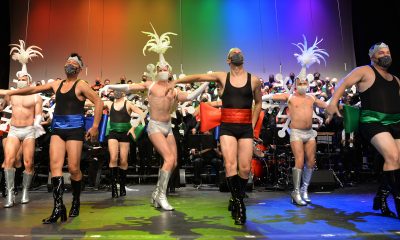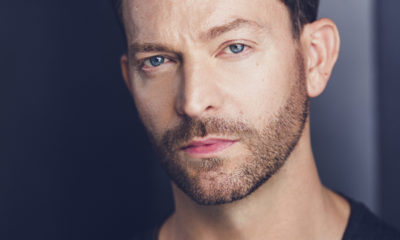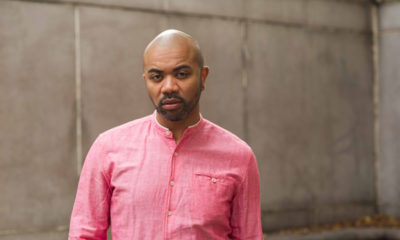Theater
Out actor/singer Ben Chavez relishes sidekick role in ‘Aladdin’
‘Yes’ attitude to life, spirituality and sexuality landed N.J. singer in touring co.
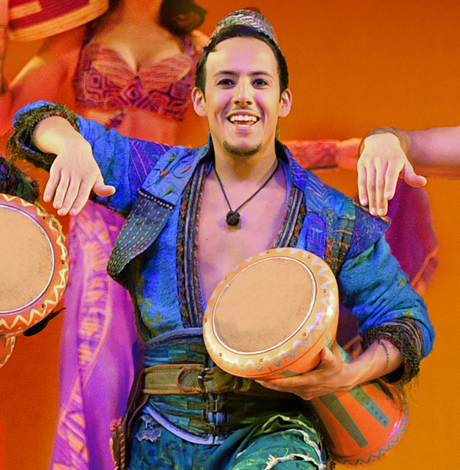
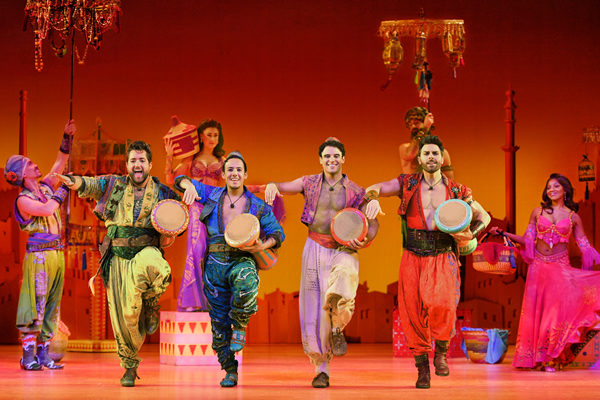
Disney’s ‘Aladdin’
Through Sept. 7
Kennedy Center Opera House
$39-179
202-467-4600
There’s a ground rule in improvisational comedy. It’s called “yes, and” — the idea is that you never reject what your improv partner throws at you. Rather than shut it down, you go with it and add something to the scene.
Out actor Ben Chavez, part of the national tour of Disney’s “Aladdin” (now at the Kennedy Center Opera House), describes “yes, and” as his personal mantra.
“I’m open to whatever’s being put into my path. In this moment it’s travel, ‘Aladdin,’ and exploring a social life as a single gay man. I’m saying yes and seeing where it all takes me.”
Chavez plays Omar, one of three sidekicks who follow likeable Aladdin (Clinton Greenspan) through an exciting adventure that spans from street hustling to princely pursuits. The pals are different, Chavez explains. While Babkak (Zach Bencal) is obsessed with food and Kassim (Colt Prattes) is a hot head who wants to take the lead, Omar is rather noble, trusting and sentimental.
And though Omar comes off as more than a tad fey, Chavez doesn’t perceive him as gay. In his storytelling, Omar is straight, a little Latin lover who carries a cute torch for Princess Jasmine (Kaenaonalani Kekoa).
“I sprinkle some of my background (Italian and Salvadoran) into the part,” Chavez says. “I’m a type: a short Latin guy with an atypical look. I’m cast in character roles. Sidekicks. Funny bits. That’s my niche. Omar is exactly that.”
Initially, the trio was intended to be part of the animated film in the ’90s. But animal sidekicks were in vogue, so the guys were replaced with a monkey named Abu, Chavez says. But for the Broadway musical, a human trio works better than recreating a beloved monkey on stage.
Choreographed and directed by hitmaker Casey Nicholaw, “Aladdin” recently marked its fifth year on Broadway. The North American has been underway for about two years. Chavez joined the company as Omar four months ago.
It’s a big glitzy show filled with Disney magic and familiar tunes (“A Whole New World,” and Genie and Aladdin’s “Friend Like Me”). There’s some grownup humor and romance. It makes a perfect date, Chavez says.
As Omar, Chavez is living his dream.
“I’m not only traveling and working with a national tour, but I’m bringing Broadway to people. And I’m giving kids a glimpse into theater maybe for the first time.”
For Chavez, geography has figured prominently in his destiny. From his childhood home in Rutherford, N.J., he could see the Manhattan skyline. It was like Broadway beckoned. Over the years, he frequently made the short trip into the city for lessons in dance, voice (he’s a tenor) and acting — everything from pirouettes to Shakespeare, he says. And to see shows (“Les Misérables” was his first).
For Chavez, New York City was the ideal place to come out, and not for the reasons one might initially suspect.
“In New York, there are some beautiful Christian communities of faith that are extremely welcoming and LGBTQ affirming. That’s something I didn’t know existed, and it was an exciting discovery. We all need a spiritual home whether it’s church, a group, yoga class or some kind of mediation. Since coming out in my freshman year at N.Y.U., I’ve been on an exciting journey to marry Christianity with sexuality. For a long time, I thought they were mutually exclusive, but they aren’t.”
Also, an accomplished composer who has played piano since age 3, Chavez takes time to write songs on the road (every theater offers access to a piano).
“Writing music is like a diary, a place where I can explore my deepest feelings and thoughts,” he says. “And unlike performing, I have total control when I compose.”
His goal on tour is to write a new song in every city. Thus far, he’s been successful. Chavez hasn’t begun his D.C. song yet, but says “There’s definitely lots to work with here.”
Theater
A hilarious ‘Twelfth Night’ at Folger full of ‘elegant kink’
Nonbinary actor Alyssa Keegan stars as Duke Orsino
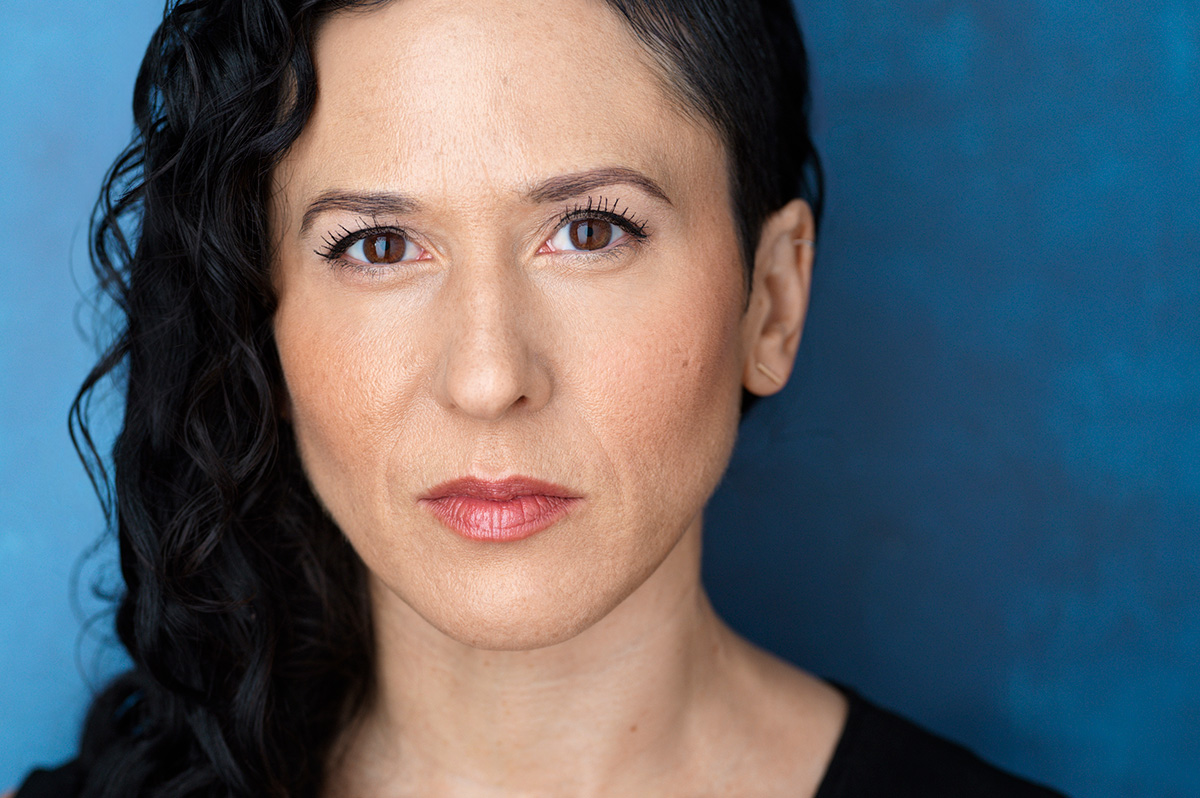
‘Twelfth Night’
Through June 22
Folger Theatre
201 East Capitol St., S.E.
$20-$84
Folger.edu
Nonbinary actor Alyssa Keegan (they/them)loves tapping into the multitudes within.
Currently Keegan plays the melancholic Duke Orsino in Folger Theatre’s production of Shakespeare’s romantic comedy “Twelfth Night.” Director Mei Ann Teo describes the production as “sexy, hilarious, and devastating” and full of “elegant kink.”
Washington-based, Keegan enjoys a busy and celebrated career. Her vast biography includes Come From Away at Ford’s Theatre; Cat on a Hot Tin Roof (Helen Hayes Award, Best Actress) and Paula Vogel’s How I Learned to Drive, both at Round House Theatre; Diana Son’s Stop Kiss directedby Holly Twyford for No Rules Theatre Company; and Contractions at Studio Theatre, to name just a few.
In addition to acting, Keegan works as a polyamory and ethical non-monogamy life and relationship coach, an area of interest that grew out of personal exploration. For them, coaching seems to work hand in hand with acting.
WASHINGTON BLADE: You’re playing the lovesick Orsino in Twelfth Night. How did that come about?
ALYSSA KEEGAN: The director was looking to cast a group of actors with diverse identities; throughout auditions, there were no constraints regarding anyone’s assigned sex at birth. It was really a free for all.
BLADE: What’s your approach to the fetching, cod-piece clad nobleman?
KEEGAN: Offstage I identify as completely nonbinary; I love riding in this neutral middle space. But I also love cosplay. The ability to do that in the play gives me permission to dive completely into maleness.
So, when I made that decision to play Orsino as a bio male, suddenly the part really cracked open for me. I began looking for clues about his thoughts and opinions about things like his past relationships and his decision not to date older women.
Underneath his mask of bravura and sexuality, and his firmness of feelings, he’s quite lonely and has never really felt loved. It makes sense to me why his love for Olivia is so misguided and why he might fall in love with the Cesario/Viola character.
BLADE: As an actor, do you ever risk taking on the feelings of your characters?
KEEGAN: Prior to my mental health education, yes, and that could be toxic for me. I’ve since learned that the nervous system can’t tell the difference between real emotional distress and a that of a fully embodied character.
So, I created and share the Empowered Performer Project. [a holistic approach to performance that emphasizes the mental and emotional well-being of performing artists]. It utilizes somatic tools that help enormously when stepping into a character.
BLADE: Has changing the way you work affected your performances?
KEEGAN: I think I’m much better now. I used to have nearly debilitating stage fright. I’d spend all day dreading going onstage. I thought that was just part of the job. Now, I’ve learned to talk to my body. Prior to a performance, I can now spend my offstage time calmly gardening, working with my mental health clients, or playing with my kid. I’m just present in my life in a different way.
BLADE: Is Orsino your first time playing a male role?
KEEGAN: No. In fact, the very first time I played a male role was at the American Shakespeare Center in Staunton, Va. I played Hipolito in Thomas Middleton’s The Revenger’s Tragedy.
As Hipolito, I felt utterly male in the moment, so much so that I had audience members see me later after the show and they were surprised that I was female. They thought I was a young guy in the role. There’s something very powerful in that.
BLADE: Do you have a favorite part? Male or female?
KEEGAN: That’s tough but I think it’s Maggie the Cat. I played the hyper-female Maggie in Tennessee Williams’ Cat on a Hot Tin Roof at Round House. In the first act she didn’t stop talking for 51 minutes opposite Gregory Wooddell as Brick who barely had to speak. That lift was probably the heaviest I’ve ever been asked to do in acting.
BLADE: What about Folger’s Twelfth Night might be especially appealing to queer audiences?
KEEGAN: First and foremost is presentation. 99% of the cast identify as queer in some way.
The approach to Shakespeare’s text is one of the most bold and playful that I have ever seen. It’s unabashedly queer. The actors are here to celebrate and be loud and colorful and to advocate. It’s a powerful production, especially to do so close to the Capitol building, and that’s not lost on any of us.
Theater
‘We Are Gathered’ a powerful contemplation of queer equality
Arena production dives fearlessly into many facets of same-sex connection
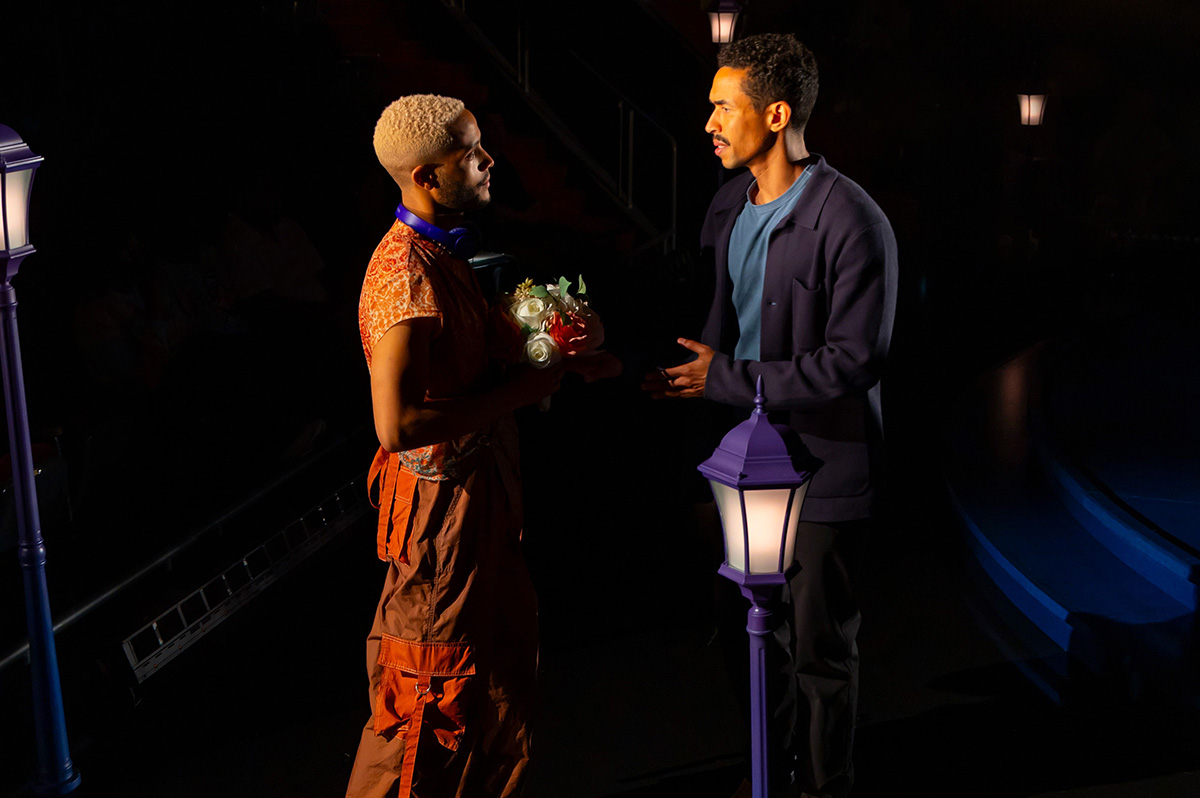
‘We Are Gathered’
Through June 15
Arena Stage
1101 Sixth St., S.W.
$70-$110
Arenastage.org
Aptly billed as a queer love story, Tarell Alvin McCraney’s terrific new play “We Are Gathered” (now at Arena Stage) dives deeply and fearlessly into the many facets of a same-sex connection and all that goes with it.
McCraney’s tale of two gay men’s romance unfolds entertainingly over two acts. Wallace Tre (Kyle Beltran), a tense architect, and his younger partner Free (Nic Ashe), a campy and fun-loving musician with a deep sense of quiet and peace are contemplating marriage after five years together, but one of the two isn’t entirely comfortable with the idea of imminent matrimony.
At 14, Wallace Tre (nicknamed Dubs) first learned about gay cruising via renowned British playwright Caryl Churchill’s seminal work “Cloud Nine.” It was an intoxicating introduction that led Dubs to an exciting world of sex and risk.
Soon after, a nearby park became a thrilling constant in his life. It remains a source of excitement, fun, danger, and fulfillment. The local cruising zone is also a constant in McCraney’s play.
One memorable evening, Dubs experienced a special night in the woods, a shadowy hour filled with exhilaration and surprise. That’s when Dubs unpredictably learned something he’d never felt before. That night in the park, he met and fell madly in love with Free.
In addition to being a talented playwright, McCraney is the Academy Award-winning Black and queer screenwriter of “Moonlight,” the 2016 film. He’s happy to be a part of WorldPride 2025, and grateful to Arena for making space for his play on its stage. McCraney says he wrote “We Are Gathered” as a contemplation of queer marriage and the right for same-sex couples, like opposite-sex couples, to marry anywhere in the United States.
For Dubs, it’s important that Free speak openly about how they met in the park. He’d like Free to share the details of their coming together with his supportive grandparents, Pop Pop (Craig Wallace) and Mama Jae (out actor Jade Jones). As far as they know, their grandson met Dubs at a lovely gathering with a nice crowd assembled under a swanky canopy. When in truth it was a park busy with horny guys cruising beneath a canopy of leafy verdure.
Understandably, Free is more than a tad embarrassed to reveal that he enjoyed al fresco sex with Dubs prior to knowing his boyfriend’s name. Clearly, in retrospect, both feel that their initial meeting is a source of discomfort, tinged with awkwardness.
There is a lot more to “We Are Gathered” than cruising. Dubs and Free are ardently liked by friends and family. Both are attractive and smart. Yet, they’re different. Free is quite easy going while Dubs is, at times, pricklier.
While Free is part of a happy family, Dubs’s people aren’t entirely easy. He grew up with a strung-out mother and a cold father (Kevin Mambo). Yet, his sister Punkin (Nikolle Salter), an astronaut, is very caring and close to him. While she doesn’t necessarily like “the gay stuff,” she very much wants to live in a world where there’s room for her gay brother.
Adeptly directed by Kent Gash, the production is memorable, and it’s not his first collaboration with McCraney. Ten years ago, Gash, who’s Black and queer, staged McCraney’s “Choir Boys” at Studio Theatre, another well-written and finely staged work.
“We Are Gathered” is performed in the round in Arena’s cavernous Fichandler Stage. The space is both a forest and various rooms created by designer Jason Sherwood and lighting designer Adam Honoré. It’s a world created by elevating a circular platform surrounded by charming street lamps both hanging overhead and lining the perimeter.
Ultimately, what takes place in “We Are Gathered” is a party, and something even more; it’s a paean to marriage, and a call to a sacrament.
Theater
Trans performer, juggler premiering one-woman show

Circus of the Self
May 29-June 6
Spooky Action Theater
1810 16th St., N.W.
Pay-What-You-Can: May 2
All other performances: $35
Spookyaction.org
For Lucy Eden, tricks have proved a way into theater.
The Oakland, Calif.-based trans performer and juggler is premiering her one-woman show “Circus of the Self” at Spooky Action Theater in conjunction with WorldPride.
Directed by Spooky Action’s artistic director Elizabeth Dinkova, the autobiographical busking show is a unique blend of circus and serious storytelling.
Juggler first met director several years ago in Atlanta. Eden explains, “She was working at a theater down the street from the juggling club where I spent a lot of time. She needed people for a street fair. I agreed. Another collaboration soon followed.”
Previously, Eden had worked mostly as a roaming performer at Atlanta corporate events and street style pre-game shows for the Braves: “Those environments were a good way to work on material, to learn what tricks make people stop their talking and turn their attention to me,” she says.
Now based in Oakland, Calif., Eden, 40, has created a 77-minute-long one-woman show infused with burlesque, expert juggling, and a personal, sometimes difficult, story.
While she hesitates to say it’s the obligation of all trans people to tell their stories, she says, “In these times, if you get the opportunity, I believe you ought to take it.”
Recently, she took a break from preparations, to talk life and showbiz.
BLADE: How exactly did you learn circus tricks?
EDEN: I’m autodidactic. I taught myself to juggle in the last semester of college. Things had gone wrong and I was looking for distraction. So, when I found a “three ball learn to juggle” kit, I never looked back. That lead to advanced juggling, unicycling, and balancing objects on my face.
Things began to look up. Today, I try to resist everything in my life going back to circus tricks, it almost always does.
BLADE: It sounds almost preordained.
EDEN: For sure. It changed everything. Circus skills force you to face your own failure. When you drop a ball, you can’t convince yourself or the audience that it didn’t happen. Performing, like life, forces you to develop capacities to deal with internal and external failures.
It teaches us not take ourselves, societal rules, or the idea of what’s success too seriously.
BLADE: Juggling at a cocktail party to baring your past before a rapt audience must be quite a stretch.
EDEN: It is, but rather than making a dramatic leap, I leveraged the fun and draw of circus to engage people in a more difficult conversation.
BLADE: Spooky Action’s website warns about “frank discussions of transphobia and mental health.”
EDEN: Well yeah, I grew up in rural Georgia in the 1990s. You can only imagine. Trans is integral to my identity, and a hot button term right now. I think everyone sees and hears a lot of things about trans people that don’t in fact come from actual trans people.
A big part of why I wrote this show and brought it to D.C. is because I really want audiences to have as intimate and revealing look at me as a trans persona as I can give them. I think it’s only through knowing that we can get beyond all the noise, misinformation, and fear mongering.
BLADE: Lately I hear a lot of artists bandying about the term “queer joy.” Woolly’s website uses the term in describing aspects of your show. What does it mean to you?
EDEN: It’s an important thingfor us all to be focused on right now, but we’re in a place where joy is hard to access. So, to me, it’s complex; it’s an important yet nuanced pursuit.
BLADE: As a part of the vast and promising WorldPride (through June 8) entertainment lineup, what makes your show stand out?
EDEN: It’s fun. I wrote “Circus of the Self” with a queer audience in mind. I spend a lot of time and creative energy performing for a general audience. I want this to be different. As far as I know, there’s nothing quite like my show out there.
There are a lot of shows that are a combination of storytelling and circus parts but they tend to be surface level entertainment. I think of this as more standup with circus layered on; it’s modeled after queer comedians like Hannah Gadsby and Tig Notaro whose work is driven more by personality than jokes.
I have tried to write a show for a queer audience. It has all the things I need to see for myself but never have.

